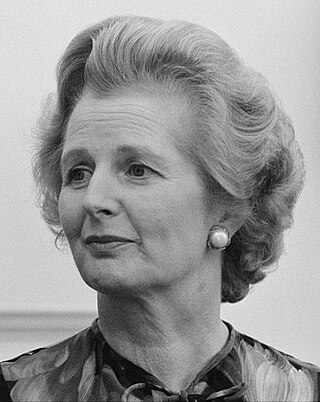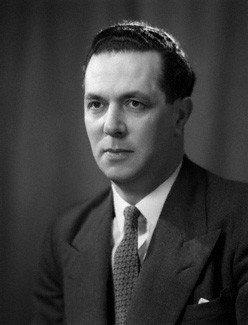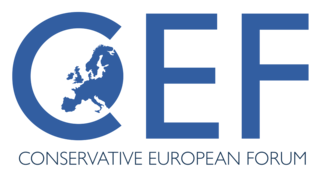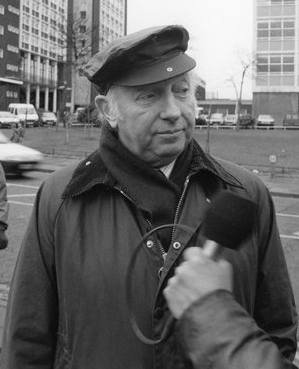| Abbreviation | CaW |
|---|---|
| Location | |
| Affiliations | Conservative Party |
| Website | www |
Formerly called | Conservative Trade Unionists |
Conservatives at Work (CaW), formerly Conservative Trade Unionists (CTU), is an organisation within the British Conservative Party made up of Conservative-supporting trade unionists. It played an important role in expanding the party's membership and influence, particularly in Britain's industrial regions. By building support within trade unions, [1] the party contributed to the reduction of the power and influence of the left. Targeting the working class became a priority for the party. This was motivated by the idea that revulsion towards Labour's egalitarian goals and redistributive policies would emerge from this group. [2]
The CTU served several purposes. One of these involved being a conduit of communication between the Conservative Party and the workers and unionists. The primary objective was for the group to effectively articulate the party's policies and principles to a working class audience. In this way, both organisations benefited. The workers were able to influence policy-making while the Conservative members, particularly at the parliamentary level, were able to determine which measures would receive support or strong opposition. [3] This was important because CTU held considerable influence on public opinion, especially in the latter part of the 1970s. CTU also influenced unionists on issues such as the right to opt out of paying a political levy. [3]
In the mid-1970s, the CTU president was Norman Tebbit (a former official of the British Airline Pilots' Association). He drafted Thatcher's speech to the CTU Conference in 1975, shortly after she was elected Conservative leader.
Under Margaret Thatcher's leadership, there was a drive for recruitment. In 1975, seven new full-time workers were appointed under a new head, John Bowis. The 1977, CTU annual conference was attended by over 1,200 delegates. [4] By 1978, there were 250 groups whose membership varied from 20 to 200 members.
In the later 1970s and early 1980s, the CTU played an important part in guiding the party toward the Trade Union reforms introduced by James Prior, who was appointed Secretary of State for Employment after Thatcher became Prime Minister in 1979.
Peter Bottomley (a member of the Transport and General Workers' Union) was CTU president from 1978 to 1980. Sir Brian Mawhinney was president from 1987 to 1990.
In the 1990s, with the decline in union influence, CTU membership waned. After the Conservative defeat in the 1997 General Election the organisation was renamed Conservatives at Work.

Margaret Hilda Thatcher, Baroness Thatcher, was a British stateswoman and Conservative politician who served as Prime Minister of the United Kingdom from 1979 to 1990 and Leader of the Conservative Party from 1975 to 1990. She was the first female British prime minister and the longest-serving of the 20th century. As prime minister, she implemented economic policies that became known as Thatcherism. A Soviet journalist dubbed her the "Iron Lady", a nickname that became associated with her uncompromising politics and leadership style.
The Conservative Party, officially the Conservative and Unionist Party and also known colloquially as the Tories, is one of the two main political parties in the United Kingdom, along with the Labour Party. It is the current governing party, having won the 2019 general election, and has been the primary governing party in the United Kingdom since 2010. The party is on the centre-right of the political spectrum, and encompasses various ideological factions including one-nation conservatives, Thatcherites, and traditionalist conservatives. The party currently has 354 members of Parliament, 260 members of the House of Lords, 9 members of the London Assembly, 31 members of the Scottish Parliament, 16 members of the Welsh Parliament, 4 directly elected mayors, 30 police and crime commissioners, and around 5,647 local councillors. It holds the annual Conservative Party Conference.

The 1979 United Kingdom general election was held on Thursday 3 May 1979 to elect 635 members to the House of Commons.

Thatcherism is a form of British conservative ideology named after Conservative Party leader Margaret Thatcher that relates to not just her political platform and particular policies but also her personal character and style of management while in office. Proponents of Thatcherism are referred to as Thatcherites. The term has been used to describe the principles of the British government under Thatcher from the 1979 general election to her resignation in 1990, but it also receives use in describing administrative efforts continuing into the Conservative governments under John Major and David Cameron throughout the 1990s and 2010s. In international terms, Thatcherites have been described as a part of the general socio-economic movement known as neoliberalism, with different countries besides the United Kingdom sharing similar policies around expansionary capitalism.
One-nation conservatism, also known as one-nationism or Tory democracy, is a paternalistic form of British political conservatism. It advocates the preservation of established institutions and traditional principles within a political democracy, in combination with social and economic programmes designed to benefit the ordinary person. According to this political philosophy, society should be allowed to develop in an organic way, rather than being engineered. It argues that members of society have obligations towards each other and particularly emphasises paternalism, meaning that those who are privileged and wealthy should pass on their benefits. It argues that this elite should work to reconcile the interests of all social classes, including labour and management, rather than identifying the good of society solely with the interests of the business class.

Keith Sinjohn Joseph, Baron Joseph,, known as Sir Keith Joseph, 2nd Baronet, for most of his political life, was a British politician. A member of the Conservative Party, he served as a minister under four prime ministers: Harold Macmillan, Alec Douglas-Home, Edward Heath and Margaret Thatcher. He was a key influence in the creation of what came to be known as "Thatcherism".
The Bruges Group is a think tank based in the United Kingdom. Founded in 1989, it advocates for a restructuring of Britain's relationship with the European Union and other European countries. Its members and staff campaign against the notion of an "ever-closer union" in Europe and, above all, against British involvement in a single European state. The group is often associated with the Conservative Party, including MPs such as Iain Duncan Smith, Daniel Hannan, John Redwood, and Norman Lamont. However, it is formally an independent all-party think tank, and some Labour MPs and peers have cited the publications or attended the meetings of the Bruges Group through the years, such as Frank Field, Gisela Stuart, Lord Stoddart of Swindon and Lord Shore of Stepney.
The Freedom Association (TFA) is a pressure group in the United Kingdom that describes itself as "a non-partisan, classically liberal campaign group, which has links to the Conservative Party and UK Independence Party (UKIP). TFA was founded in 1975 as the National Association for Freedom (NAFF) and gained public prominence through its anti-trade union campaigns. Its popularity grew after campaigning against perceived abuses to individual freedom including big business, big government, organised labour and Irish political violence. By the end of the 1970s the organisation had around 20,000 members.
The Selsdon Group is a British free-market economics pressure group, closely associated with the Conservative Party. Selsdon Group members believe that economic freedom is the indispensable condition for political and social freedom. The group's President is John Redwood MP.
In the United Kingdom, the word liberalism can have any of several meanings. Scholars primarily use the term to refer to classical liberalism. The term can also mean economic liberalism, social liberalism or political liberalism. It can simply refer to the politics of the Liberal Democrats, a UK party formed from the merger of two centrist parties in 1988. Liberalism can occasionally have the imported American meaning; however, the derogatory connotation is much weaker in the UK than in the US, and social liberals from both the left and right wing continue to use liberal and illiberal to describe themselves and their opponents, respectively.

The Conservative Party is the oldest political party in the United Kingdom and arguably the world. The current party was first organised in the 1830s and the name "Conservative" was officially adopted, but the party is still often referred to as the Tory party. The Tories had been a coalition that more often than not formed the government from 1760 until the Reform Act 1832. Modernising reformers said the traditionalistic party of "Throne, Altar and Cottage" was obsolete, but in the face of an expanding electorate 1830s–1860s it held its strength among royalists, devout Anglicans and landlords and their tenants.

Euroscepticism in the United Kingdom is a continuum of belief ranging from the opposition to certain political policies of the European Union to the complete opposition to the United Kingdom’s membership of the European Union. It has been a significant element in the politics of the United Kingdom (UK). A 2009 Eurobarometer survey of EU citizens showed support for membership of the EU was lowest in the United Kingdom, alongside Latvia and Hungary.

The Conservative European Forum (CEF) was founded in 1969 to promote the UK's entry into the European Economic Community. The organisation is committed to a positive and constructive approach to the UK's relationships with the democracies of Europe, including the European Union.

Margaret Thatcher's term as the Prime Minister of the United Kingdom began on 4 May 1979 when she accepted an invitation of Queen Elizabeth II to form a government, and ended on 28 November 1990 upon her resignation. She was elected to the position in 1979, having led the Conservative Party since 1975, and won landslide re-elections in 1983 and 1987. She gained intense media attention as Britain's first female prime minister, and was the longest-serving British prime minister of the 20th century. Her premiership ended when she withdrew from the 1990 Conservative leadership election. While serving as prime minister, Thatcher also served as the First Lord of the Treasury, the Minister for the Civil Service and the Leader of the Conservative Party.
Libertarianism in the United Kingdom can either refer to a political movement synonymous with anarchism, left-libertarianism and libertarian socialism, or to a political movement concerned with the pursuit of propertarian right-libertarian ideals in the United Kingdom which emerged and became more prominent in British politics after the 1980s neoliberalism and the economic liberalism of the premiership of Margaret Thatcher, albeit not as prominent as libertarianism in the United States in the 1970s and the presidency of Republican Ronald Reagan during the 1980s.
Conservatism in the United Kingdom is related to its counterparts in other Western nations, but has a distinct tradition and has encompassed a wide range of theories over the decades of conservatism. The Conservative Party, which forms the mainstream centre-right party in Britain, has developed many different internal factions and ideologies.

Arthur Scargill is a British trade unionist who was President of the National Union of Mineworkers (NUM) from 1982 to 2002. He is best known for leading the UK miners' strike (1984–85), a major event in the history of the British labour movement.
The history of trade unions in the United Kingdom covers British trade union organisation, activity, ideas, politics, and impact, from the early 19th century to the present.
The GCHQ trade union ban was a ban on trade union membership of employees at the Government Communications Headquarters in Cheltenham between 1984 and 1997. This was based on the claim by the Conservative government that it undermined national security. It sparked a dispute which became a cause célèbre, one of the most important trade union issues of the 1980s and the second longest continuously fought dispute in British trade union history.